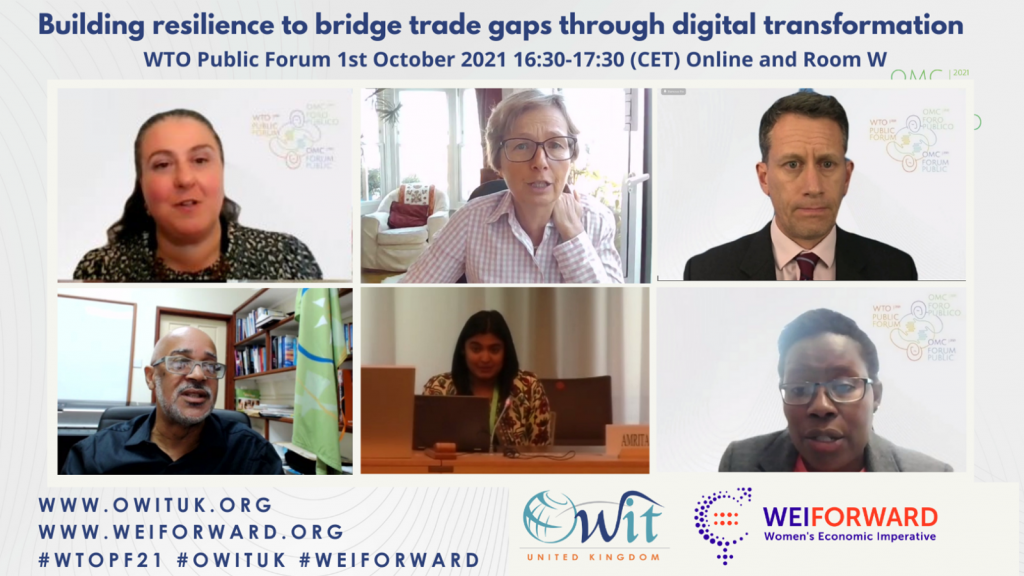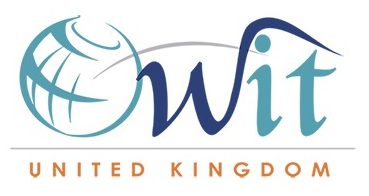OWIT UK and WEIFORWARD TRADE CO-HOST AT WTO PUBLIC FORUM 2021
Building Resilience To Bridge Trade Gaps Through Digital Transformation

A working session co-hosted by OWITUK and WEI (WOMEN’S ECONOMIC IMPERATIVE) was held virtually on October 1, 2021.Speakers included H.E. Dr. Didacus Jules, Susan Barton, Chris Southworth and Dr. Amrita Bahri, and the session focused on building resilience to bridge the trade gap through digital transformation.
Following is the session report with outcomes:
Session Overview & Recommendations
Speakers:
H.E. Dr. Didacus Jules: Director-General, Commission of the Organisation of Eastern Caribbean States
Susan Barton: Team Leader, Trade and Gender Equality, Trade Policy, Department for International Trade, United Kingdom
Chris Southworth: Secretary General, International Chamber of Commerce (ICC), United Kingdom
Dr. Amrita Bahri: Associate Professor of International Trade Law at Instituto Tecnológico Autónomo de México (ITAM); Co-Chair Professor, WTO Chair Program, Geneva
Moderator: Noreen Burroughes Cesareo: President Organisation of Women in International Trade (OWIT UK); Trade Lead Women’s Economic Imperative (WEI)
Recap: Dr Roseline Wanjiru: Global Lead on Trade & Investment Policy, WEI
Technical: Nicole Pitter Patterson: VP International OWIT UK; Trade Lead, WEI
OWIT UK and WEI hosted a working session with expert representatives from the UK Government, global NGOs, inter-governmental organizations and trade experts. They discussed ways in which government and private enterprise can collaborate to ensure the broadest range of opportunities remain open to all women to acquire digital skills, build resilience and ensure sustainable growth in international trade following the disruptions and further inequalities in supply chains caused by the pandemic. Outcomes suggest possible collaboration in areas such as digital transformation and solutions can be implemented and shared as best practice globally.
OUTCOMES
Trade Agreements can be a useful tool to support women’s participation in international trade. Assessing and reviewing the gender components within trade agreements can potentially enhance women’s access to technology, support inclusion and increase the economic empowerment of MSMEs and women-owned businesses.
Digital Payment Systems: Resilient payment systems are necessary for thriving digital trade ecosystems. Emerging digital innovations pioneered in diverse contexts, such as DCash digital currency in the Eastern Caribbean Currency Union, or the paperless trade processes in St Kitts and Nevis, are examples that can scale up internationally to bridge trade gaps through digital transformation.
Facilitation of Digital Trade Processes: Co-ordinated bilateral and multilateral responses are required to address trade gaps, resolve the critical components that support ecommerce and facilitate digital trade processes. Concerted action can address the prevailing digital divides and support inclusive digitisation.
Policy Making: Governments and multilateral agencies must actively support women-traders through multi-lateral and bilateral policy-making on digital trade. Digital trade principles currently being developed, such as those by the G7 under the UK Presidency, can enhance the potential for trade policy as a tool to scale up and boost the digital inclusion agenda.
Digital Trade: The low proportion of trade transactions being completed electronically is a persistent barrier for women’s participation in international trade. In the wake of Covid-19 and the post-pandemic recovery, there are calls for concerted interventions to digitise trade documentation and facilitate the wider adoption of digital original documents that replace traditional paper documents.
Building a Robust Digital Trade Ecosystem. There are various initiatives to enhance digital trade efficiencies, coordinate trade resources, secure digital trade finance and build consensus on the adoption of digital trade documentation, such as those by the ICC in the UK. They indicate a way forward that can scale up elsewhere to increase digital trade transactions.
The report has been uploaded to the WTO Public Forum site and can be accessed here.
